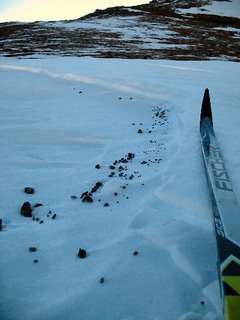A bearberry ski

Flitting around the lake at the base of that last steep face up to powerline pass this morning I was looking down trying not to get tripped up by the very small and not so very small sastugi and observing the small rocks scattered across the surface of the snow in windswept lines and caught in the snow contours. One rock caught my attention as being particularly round amidst the angular debris. I noticed several more unnaturally rotund rocks. Blueberries! I picked one up and discovered that it was not a blueberry but in fact was a bearberry. And I ate it. I also got a rock that had been frozen to the berry but I spat that out instead of eating it.
A little higher up a came upon a bluff that had been windswept down to the ground and whole clusters of bearberries were waiting to be harvested still frozen to the plant. I didn't stop to snack although I would have had they been blueberries, blueberries being universally agreed to be more delectable than bearberries. I wish they had been blueberries! Although it's probably better they weren't since at 11°F it's generally a bad idea to sit down and eat frozen blueberries at the top of a long descent.
*Photo courtesy of Tim Kelley. It is a good photo, isn't it? Aside from that ridiculous Fischer ski, bah!


4 Comments:
A bearberry? I don't think those exist Laura. Neither does the word "ars" or the word "moiler". If possible we should take our scrabble regulations down a notch, allowing us to play whatever words we want. Then I could have played "sampouts". Alas.
Bearberries are three species of dwarf shrubs in the genus Arctostaphylos. Unlike the other species of Arctostaphylos (see Manzanita), they are adapted to arctic and sub-arctic climates, and have a circumpolar distribution in northern North America, Asia and Europe, one with a small highly disjunct population in Central America.
"Native Americans also used Bearberry tea to treat inflammation of the urinary tract, urethritis, kidney stones, and cystitis. The Cheyenne used the tea to treat back sprains. Some Native American tribes powdered the leaves and applied them to sores. Other tribes drank it to treat venereal diseases. The berries were also made into a tea that was used to ward off obesity."
Wow, I just thought of bearberries as a lesser cousin of blueberries. Sounds like they are pretty worthwhile in their own accord. Thanks for the info.
Post a Comment
<< Home